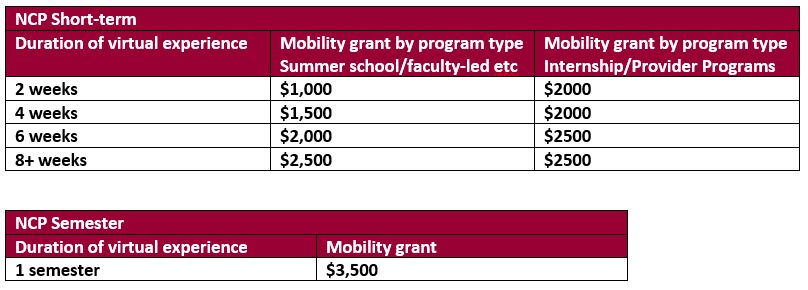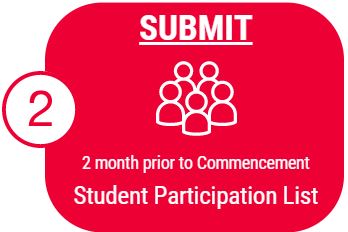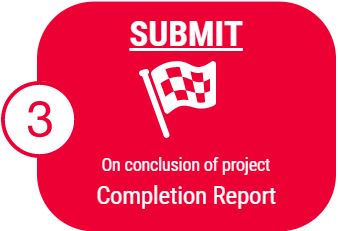NCP Mobility Program Online
Important Notice: With the resumption of travel, new projects must be implemented in-person, rather than relying on virtual implementation. It is important to note that new projects are prohibited from being delivered virtually.
About
Due to the pandemic and restrictions on international travel, Australian students may be unable to conduct their programs physically situated in Indo-Pacific locations.
Until restrictions are lifted and the welfare of students and staff can be appropriately managed, the Australian Government has permitted online delivery of elements of the NCP. This would include mobility projects and internships, where these virtual study and work-based experiences are supported by strong relationships with Indo-Pacific institutions and private sector organisations.
The online delivery of international experiences will maintain the momentum of the NCP, building and reinforcing people-to-people, institutional and business linkages between Australia and the Indo-Pacific region. It will encourage increased diversity and participation by students for whom international travel presents challenges.
The Australian Government has approved this temporary approach as a response to the COVID-19 pandemic. The NCP will revert to normal arrangements as soon as it is possible to do so, when travel to host locations can be resumed and student safety and welfare can be appropriately met. The Government will review the outcomes of online delivery of projects at this time, noting, that immersive, in-country experiences is the preferred method and hallmark of the NCP. Find out more.
If you require further information or assistance, contact the Western Sydney University New Colombo Plan International Liaison, Steven McDonald.
1. Types of Projects
The Australian Government are encouraging universities, where possible, to look at innovative ways to deliver their current NCP mobility projects to provide online experiential learning for students. Consistent with current NCP mobility guidelines, student must receive academic credit or the activity must count towards the requirements for their course of study in which they are enrolled.
The types of projects may include, but are not limited to the following:
Collaborative Online International Learning (COIL)
COIL is the co-development of a shared syllabus by two or more instructors from geographically distant locations. COIL is an innovative way to engage students in a shared, online multicultural and collaborative learning environment. An NCP project would see Western students work with cohorts of students and staff from the Indo-Pacific institutions. Further information about developing a COIL unit, can be found on the Western Sydney University COIL webpage.
Online International Learning (OIL)
Students experience online learning with partner institutions (summer schools etc.). Example: Hong Kong Baptist University Virtual Exchange Programme (September 2020)
Online Instructor led programs
Moderated by a project leader with overseas partners and/or organisations in the region. Example: CISaustralia: Customised Programs. For Western staff interested in developing an exciting and interactive Customised Virtual Program, please contact Jane O’Keeffe jane@cisaustralia.com.au
Online Internships and Practicums
- Students are provided with work experience with off-shore Indo-Pacific organisations. This will enable students to expand their communication, team work and problem-solving skills as they work across cultures, time-zones and languages. Examples:
- CISaustralia: Virtual Internships, China and Hong Kong. For Western staff interested in developing a tailored program or group project, please contact Alison Price alison@cisaustralia.com.au
- Pagoda Projects: Remote Internships, China, Taiwan and Vietnam - For Western staff interested in developing a tailored program or group project, please contact paul.bailey@pagodaprojects.com
- CRCC Asia: Virtual International Internships. For Western staff interested in developing a tailored program or group project, please contact Katy Clark, k.clark@crccasia.com
- Virtual Internships in Asia, For Western staff interested in developing a tailored program or group project, please contact Jerome La Carrou contact@nextstepconnections.com
Work Integrated Learning (WIL)
- These innovative programs enable students to collaborate and solve real-life business problems, working with partner corporations in the Indo-Pacific. Examples (to be adapted for NCP):
- HEX. For Western staff interested in developing a tailored program or group project, visit the dedicated partner page or contact Chris Hoffmann chris@hacker.exchange
- Virtual Experiential Learning Program. For Western staff interested in developing a tailored program or group project, please contact Janina Voss janina@peopleandfriends.org
Examples of current opportunities offered to students, can be found on the Online Global Learning webpage. This site is updated regularly.
2. Principles
The shift away from in-country experiences should not diminish the quality and impact of mobility projects. Students should continue to establish life-long connections in the Indo-Pacific, deepen their understanding of foreign cultures and increase their future employability as graduates with genuine global experience.
A student may participate in a virtual NCP Mobility project in addition to receiving one short term and one semester length in-country NCP mobility project.
The Government encourages students from diverse backgrounds to participate in virtual mobility programs, noting that such online opportunities could improve accessibility for students who have work, family, and carer, cultural or other commitments; or whose capacity to travel is affected by disability or health issues.
3. Funding
Western Sydney University may use existing funding provided under the NCP mobility program. Current project leaders may seek a variation to deliver existing projects through online arrangements:
- Short-term: Only one type of online program can be utilised by an existing project, e.g. COIL, OIL, internship, practicum etc.
- Semester: may offer two or more virtual program types e.g. semester exchange, an internship and language training etc.
- Consistent with current NCP mobility guidelines, students participating in an NCP mobility project must receive the same amount of funding. However, to allow more students to participate in a project, a university may provide smaller grants to a larger number of students in a particular online project up to the approved grant amount.
As a guide, the indicative grant recommended per student is outlined in the following table. Project leaders may submit a variation that provides DFAT with costings for a project to justify a higher proposed amount for consideration in the project variation request. DFAT will consider favourably defensible and clearly itemised costings on a case-by-case basis.
4. Proposal for a Project Variation
Any variations to the original project requires approval from the Australian Government. This includes changes to the project leader(s), description, dates, destination or partners. Changes to the project, means the University needs to enter into a new agreement with the Australian Government. This includes the online delivery of international experiences. Project leaders will need to submit a variation proposal for an existing project. The NCP Secretariat will consider each variation request on a case-by-case basis where the online experiences are supported by established relationships with Indo-Pacific institutions and organisations.
To change an existing project, download the Proposal for a Project Variation (opens in a new window) and send to New Colombo Plan International Liaison, Steven McDonald. Western Sydney International will submit the information to NCP Secretariat for consideration.
In in-depth reason is required. The Government will reject a request to vary an agreement if the response is inadequate. Variations need to be clear and concise and generally no more than three short paragraphs detailing:
- The type of experience being offered
- General overview and benefits
- Duration of the project
- The costs associated with the virtual experience
- Number of students
- Value of grant per student, e.g. $1500 (for online learning)
5. Online Teaching and Partnerships
Western Sydney University Policy for Developing Units
- If you are developing an online unit, you are required to observe university policy and School/Institute approval processes for unit development.
Support for Online Teaching, Learning, and Assessment
- The Learning Futures Portfolio is providing support for academics teaching online during the period of social distancing through online workshops and consultations. See Learning Futures.
- Other Resources
- Resources to assist with your online teaching and assessment design can be accessed by the below links or right hand menu on this page.
- Online Professional Learning Modules
The Professional Learning and Recognition vUWS site offers a range of self-paced, online teaching and learning modules for Western staff across all roles and levels of responsibility, to complement other professional learning opportunities to enhance teaching practice and student learning experiences. - Active Learning Website
The Active Learning Website provides materials to help you design and facilitate active learning in your online setting or face-to-face classroom. - If you have any queries regarding available support, please contact LearningFutures@westernsydney.edu.au.
Best Practice in Online Learning
- The Forum on Education Abroad provides a Guide to Online Global Learning Experiences. This guide has been prepared for university staff who are new to online global learning and want to learn more about how to do them well. The guide is intended for a broad range of curricular or co-curricular global learning experiences.
- If you are developing a Collaborative Online International Learning (COIL) experience, it is advised that you visit Western Sydney University’s COIL website.
Overseas Partners and Providers
- WSI is responsible for the assessment and screening of all proposed international programs and partnerships across the University.
- If you would like to develop an online opportunity with an overseas university or provider that is not a University partner (or if you are unsure), feel free to reach out to the Manager Short Term Mobility for advice. WSI maintains ongoing partnerships with institutions and providers around the world and can help you identify prospective programs, whilst ensuring the correct due diligence process is being followed and the right agreements are in place.
- Note: if you decide to pursue an online opportunity, a Memorandum of Understanding may need to be signed between each institution.
6. Managing a Program and Compliance
Student Eligibility
- be an Australian citizen.
- be undertaking a Bachelor Degree (Level 7) or Bachelor Honours Degree (Level 8), as defined by the Australian Qualifications Framework at the commencement of their Mobility Project;
- not receive more than one NCP grant for an online experience during their Australian course of study
- be given academic credit or the activity must count towards the course requirements for their course of study in which they are enrolled
- The Government requires that 70% of participants in the program must be between the ages of 18 and 28. Therefore 30% of participants can be 29 and over.
Student Conditions of Participation
- NCP Student Code of Conduct
- NCP Mobility Media and Publication Guidelines
- Preventing Sexual Exploitation, Abuse and Harassment (PSEAH)
- Child Exploitation
Recruiting Students
- Western Sydney International (WSI) has implemented a new web-based platform that is designed to save time and automate processes:
- The Go Global Portal provides a dedicated webpage and online application for projects that can be tailored and promoted to students
- Project leaders will have access to the platform and will be provided with regularly updates on applications and acceptances
- Information is automatically collected for University and Government reporting
- If an online program is approved by the NCP Secretariat, WSI will talk to you about this initiative and utilising the Go Global Portal.
Selecting Students
- Western Sydney University is required to provide the Australian Government with a final list of prospective participants as early as possible, no later than 2 months prior to participation.
- Download the NCP Student List, fill out the details and return to Western Sydney International
Using Student Grants
The Government expects the student grant will meet or contribute to the cost of the online program. It will not be used to cover students’ day to day living expenses. Western Sydney University must obtain students’ written consent from each student, that the relevant funding will not be paid to them directly in order for the university to pay for the online mobility program costs.
Acknowledging the Government
- It is a mandatory requirement that the Australian Government is acknowledged in all publications, promotional materials and activities related to NCP or ELP funds. To assist with program promotion, monitoring and evaluation, the Government may seek supplementary information from universities on Mobility Projects. Project Leaders should retain photographs, newspaper clippings, video clips and/or web links documenting a project that can be provided on request.
- NCP Only: Project leaders are encouraged to send such materials to the NCP Secretariat at any time. Before sending any images of students to DFAT, Western Sydney University must seek consent from the students. This consent will be confirmed during the compulsory online acceptance
Transfer of Funds
Prior to the transfer of any funds to the Schools/Institutes, project leaders must submit a Project Plan and Risk Assessment. See Mandatory Government Reporting above. If you require any assistance, contact the Manager Short Term Mobility.
Completion Report and Acquittal of Funds
Project leaders are required to submit a Completion Report no later than 1 month after the completion of the program. Multi-year projects cannot be funded for subsequent years without a Completion Report.
8. Frequently Asked Questions
Do I have to change my NCP project to online delivery?
- No, you are permitted to keep your current project. However, please be aware that if the deadline for delivery and completion passes, the funding may have to be returned to the Government. An option is to change the travel dates further into the future, by submitting a Proposal for a Project Variation. The information will be reviewed by the NCP Secretariat and is subject to approval.
Will online delivery be an option for future rounds of the NCP?
- A hallmark of the NCP is the opportunity for immersive, in-country study experiences. The current arrangement agreed by Government is to offer online programming as a temporary measure for NCP programs whilst COVID-19 travel restrictions are in place. The NCP will revert to normal arrangements as soon as it is possible to do so. There will be consultation with universities on lessons learned 12-18 months into the running of virtual projects.
What is the easiest method for implementing an online project?
- One of the simplest methods for delivering an online project is to utilise an existing provider of Work Integrated Learning (WIL) or Online Internships opportunities - see Section 1: Types of Projects. Many of these opportunities are already available for students or the provider can tailor a project for your requirements. As a guide the indicative grants recommended per student, outlined in Section 3, benefits engaging with providers.
- Online Internships
- CISaustralia: Virtual Internships, China and Hong Kong - contact Alison Price alison@cisaustralia.com.au
- Pagoda Projects: Remote Internships, China, Taiwan and Vietnam - For Western staff interested in developing a tailored program or group project, please contact paul.bailey@pagodaprojects.com
- CRCC Asia: Virtual International Internships - contact Katy Clark, k.clark@crccasia.com
- Work Integrated Learning (WIL)
- Virtual Innovation Sprint - contact Chris Hoffmann chris@hacker.exchange
- Virtual Experiential Learning Program - contact Janina Voss janina@peopleandfriends.org
- When submitting a Proposal for a Project Variation, requests should detail the type of virtual program being offered and the duration of the project. It should clearly justify the costs associated with the online experience.
Can I change the host location?
- Existing mobility projects can be varied to be delivered in a different host country as a ‘virtual’ mobility project. ISEO will be updated to include a new host location, named ‘virtual’, which universities can select if they propose to submit a variation proposal for online delivery.
I have two or more projects – can I pool the funds?
- No. Universities are not be permitted to collate/combine/pool the funding from different mobility projects. A separate variation request must be submitted for each existing mobility project.
What happens if the students are participating in an opportunity that has a fee waiver (e.g. Exchange)?
- Costings may only apply to offerings not supported by an exchange agreement between the home and host university, in order to meet associated tuition costs (as an exchange agreement would normally be considered cost neutral).
Will universities be able to continue with some in-country and some virtual experiences from the same project if they are approved?
- You may vary projects as required from in-country to virtual delivery and vice versa (resulting in a mix of in-country and virtual experiences); however, the Secretariat prefers that variations be kept to a minimum to reduce the administrative burden for universities and the NCP Secretariat.
- You may submit a variation request that indicates an agreed number of students to participate in virtual programming (with the commensurate student grant amount) and the number of students you expect to participate in-country when borders open (for the originally agreed student grant amount).
Can multiple virtual experiences be provided under the one project?
- Universities may offer multiple virtual experiences under the one project, however the student grant amount for the virtual experience must be equal for each student participating in the virtual project. (This amount is likely to be less than the amount granted for the in-country programming – see ‘Principles’ document for indicative grant amounts for virtual programs.)All students within the same mode (virtual or in-country respectively) will need to receive the same amount of funding relevant to the delivery mode.
What is the estimated turnaround time on variations?
- Usually, we will respond within 5 business days. If we require further clarification regarding the variation request, we will contact you.
Is there any target deadline by which the NCP Secretariat would like to receive variations from universities? Or would this be an ongoing/rolling process?
- There is no target deadline. Universities are welcome to submit project variations for online delivery as needed.
Is there a suggested time frame for projects to revert back to in-country experiences once travel restrictions have eased? And would there be flexibility to complete agreed virtual experiences as per the approved variation?
- The NCP Secretariat expects that in-country mobility experiences will resume as soon as practically possible once travel restrictions are lifted, taking into account the travel advice for individual countries at the time, including on the Smartraveller website, and internal university travel policies. Government approval for the pivot to online delivery was granted for an initial 18 month period only, but is subject to review.
- Any project approved for virtual delivery may to be delivered virtually (until the approved completion date) even if travel restrictions have been lifted for that location.
Will there be possibility for virtual delivery to be provided permanently under the NCP?
- The Government has approved virtual delivery as a temporary COVID-19 measure. We would need to seek Government approval for a permanent change to delivery policy for the NCP. We would appreciate universities collecting data on student participation and including ‘good news’ case studies in their completion reports. This will assist a proposedreview of virtual programming.
If a variation is submitted which reduces the grant amount per student, and increases the number of participants, would this approach be viewed positively? If so, how will this be reflected in ISEO?
- The NCP Secretariat would most definitely welcome an increase in the number of students participating in a project as a result of virtual delivery, achieved by smaller grant amounts per student. Any reduction in the grant amount and increase of student numbers would be reflected in both the offer/finances breakdown in ISEO and well as the Deed of Variation (DoV) accompanying the variation.
Is there a view on how universities should treat students who do not complete their virtual program? Would normal refund requirements apply?
- Western Sydney University will need to manage this directly with the student on a case by case basis to determine if a refund is appropriate. Some students may have legitimate reasons for not completing the virtual experience, in which case we would support a flexible approach.
Would the NCP Mobility project leaders be able to use the grants to pay part of the student’s university tuition fees?
- No, NCP grants may not be used to fund tuition.
If a project is changed to virtual virtual delivery, do we need to stick to our original plan and credit recognition?
- Universities apply academic credit or provide course recognition towards a student's relevant course requirements for mobility projects completed by students. If the university is satisfied the that the mobility program on offer meets the course requirements for credit, or course recognition, then this would be considered acceptable. This is a matter for the individual home university to determine.
9. Contact
For general advice, see Information for Staff. If you require further information about the New Colombo Plan, contact the Western Sydney University's New Colombo Plan International Liaison, Steven McDonald.
Mobile options:






